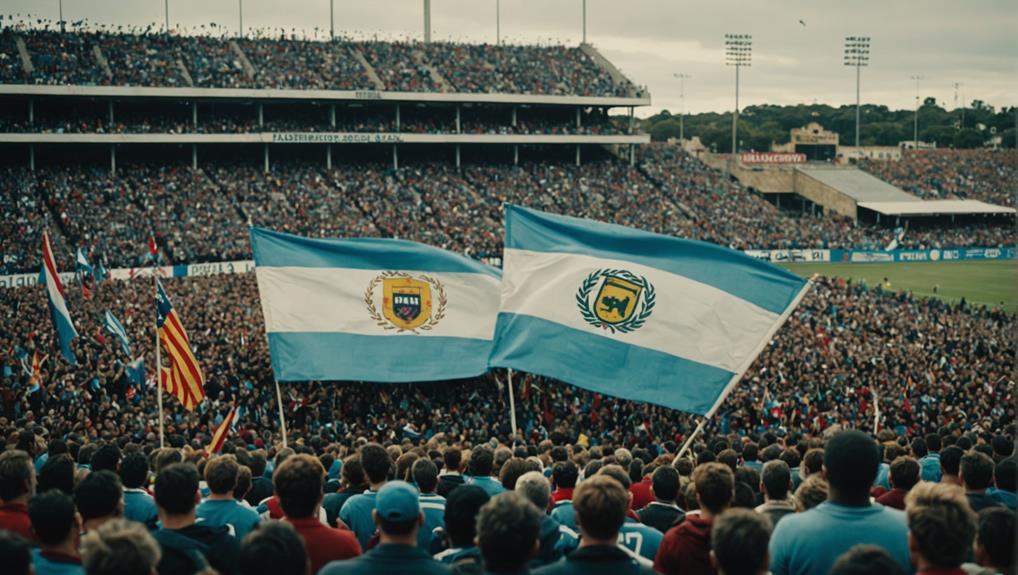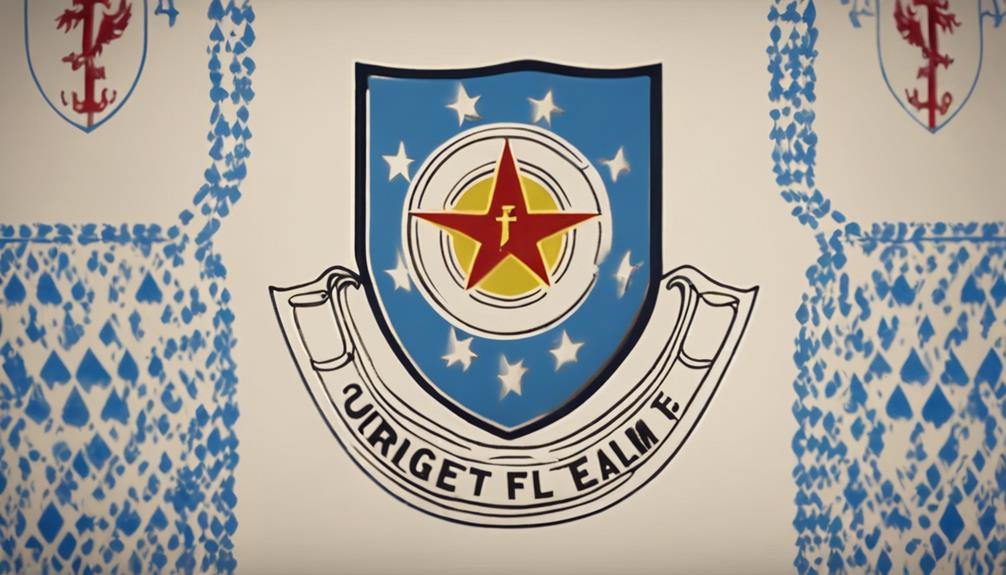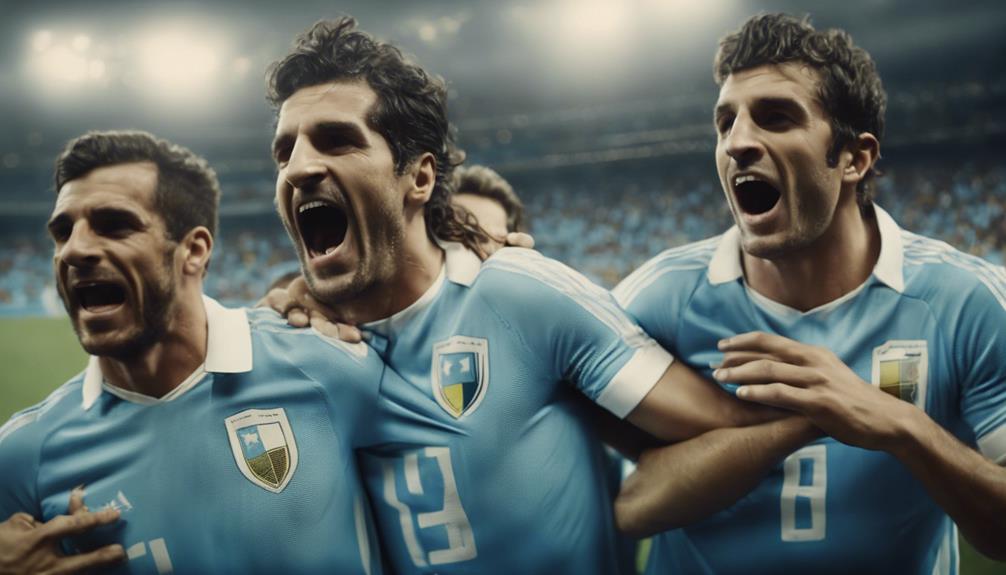
Exploring Football in Uruguay: History and Key Players
July 31, 2024If you're exploring football in Uruguay, you'll uncover a rich history shaped by British immigrants and iconic clubs like Albion F.C. and CURCC. The national team emerged in 1902, fueled by British expats, leading to their Golden Era with World Cup victories in 1930 and 1950. Legendary players such as Jose Nasazzi and Pedro Petrone solidified Uruguay's international dominance, with multiple Copa América championships and Olympic gold medals. Current stars like Luis Suárez and Diego Forlán continue this legacy. The story of Uruguay's football prowess and key players is a fascinating journey through triumphs and talent waiting to be discovered.
Early Football Development in Uruguay
The early development of football in Uruguay was greatly influenced by British immigrants who introduced the sport to the country in the late 19th century. Clubs like Albion F.C. and CURCC played pivotal roles in shaping the foundation of football in Uruguay. These clubs not only provided a platform for local players to hone their skills but also helped in popularizing the sport among the Uruguayan population.
As football continued to gain traction in Uruguay, the idea of forming a national team began to materialize. In 1902, Uruguay established its first official national team, laying the groundwork for a storied footballing history. The national team formation marked a significant milestone in the country's sporting journey, setting the stage for future successes on the international stage.
The early involvement of British expatriates and the establishment of key clubs not only accelerated the growth of football in Uruguay but also instilled a passion for the sport that would endure for generations to come.
Golden Era of Uruguayan Football
During Uruguay's Golden Era of football, their historic achievements shone brightly, with notable victories in the 1930 and 1950 World Cups. Legendary players like Jose Nasazzi and Pedro Petrone played pivotal roles in shaping Uruguay's football legacy during this period.
Their exceptional skills and unwavering fighting spirit propelled Uruguay to international dominance, solidifying their place in football history.
Historic Achievements Highlight
Exploring the Golden Era of Uruguayan Football reveals a rich tapestry of historic achievements that have shaped the nation's soccer legacy. Uruguay's international football success is highlighted by their groundbreaking victory in the inaugural FIFA World Cup in 1930, solidifying their reputation as a powerhouse in the sport.
The legendary Maracanazo triumph in 1950, where Uruguay stunned Brazil in the World Cup final, remains a pivotal moment in football history, showcasing their resilience and skill on the global stage.
In addition to their World Cup titles, La Celeste also clinched multiple Copa América championships in the 1920s, underlining their dominance in South American football. The 1935 Copa América victory further cemented Uruguay's status as a top national team in the region, contributing to their illustrious football legacy.
These historic achievements exemplify a golden era in Uruguayan football, marked by unparalleled success both domestically and internationally.
Player Contributions Recognized
Amidst the historic achievements that defined the Golden Era of Uruguayan Football, the player contributions from stars like Jose Nasazzi, Pedro Cea, Pedro Petrone, and José Andrade stand out as pivotal to the nation's soccer legacy. Nasazzi's exceptional leadership was instrumental in guiding Uruguay to victory in the 1930 FIFA World Cup and the 1924 and 1928 Olympic gold medals.
Cea and Petrone, with their prolific goal-scoring abilities, helped solidify Uruguay's legendary status in international football. Additionally, José Andrade's exceptional dribbling and playmaking skills added a unique flair to Uruguay's playing style, contributing significantly to the team's success.
The core group of players from the Golden Era embodied the Uruguayan fighting spirit, showcasing resilience, determination, and skill on the field. Their collective efforts not only brought glory to Uruguayan football but also left an indelible mark on the sport's history.
The legacy of these key players continues to inspire future generations of footballers in Uruguay, emphasizing the importance of talent, teamwork, and unwavering commitment in achieving success on the global stage.
Team Nickname and Symbolism

The nickname 'La Celeste' holds deep significance for Uruguay's national football team, symbolizing both national pride and identity. Originating from the team's blue jersey, 'La Celeste' reflects Uruguayans' strong connection to their national team. The team crest further emphasizes this bond, featuring the national flag and two stars representing Uruguay's World Cup triumphs. Inscribed on the crest is 'Asociación Uruguaya de Fútbol,' highlighting the role of the country's football association in shaping the team's identity.
The nickname 'La Celeste' serves as a powerful symbol of pride and heritage for Uruguayan football. It encapsulates the rich history and success of the national team, reminding fans of their country's achievements on the international stage. Embraced by both players and supporters, 'La Celeste' represents more than just a team name; it embodies the spirit and passion of Uruguayan football, uniting a nation under a common love for the beautiful game.
Notable Uruguayan Football Players
Noteworthy for their exceptional skills and contributions to the sport, Uruguayan football players have left a lasting impact on the global stage. Luis Suárez stands out as Uruguay's all-time leading scorer, surpassing 60 goals for the national team.
Diego Forlán, a versatile forward, was pivotal in Uruguay's success, earning the Golden Ball in the 2010 FIFA World Cup. Enzo Francescoli, a legendary striker, guided Uruguay to victory in several international tournaments, solidifying his place in Uruguayan football history.
Jose Nasazzi, renowned for his defensive prowess and leadership, played an important role in Uruguay's early triumphs.
Additionally, Pedro Cea and Pedro Petrone showcased their goal-scoring abilities, making significant contributions to Uruguay's success in international competitions. These players, hailing from clubs like Montevideo Wanderers and Atlético Madrid, have carried the Uruguayan football legacy forward.
Edinson Cavani, another prominent figure, continues the tradition of excellence set by these legendary players, further solidifying Uruguay's reputation in the football world.
Olympic Success and Dominance

Uruguay's football team secured gold at the 1924 and 1928 Olympics, solidifying their legendary status in international football. Displaying exceptional skills and tactics, they dominated opponents with an impressive playing style. In the 1924 Olympics, Uruguay's 7-0 victory over Yugoslavia highlighted their skill, speed, and effectiveness on the field. Key players like Jose Nasazzi, Pedro Cea, and Jose Andrade played pivotal roles in leading Uruguay to Olympic success. Nasazzi's leadership, Cea's goal-scoring prowess, and Andrade's playmaking abilities were instrumental in the team's victories.
These triumphs at the Olympics set the stage for Uruguay's future success in international football. Building on their Olympic dominance, Uruguay went on to win the inaugural FIFA World Cup in 1930. Their legacy of excellence continued until the 1950s, solidifying their reputation as one of the most successful footballing nations in history.
Legacy and Future of Uruguayan Football
With 15 Copa América titles, two World Cup victories, and two Olympic gold medals, Uruguay's football legacy exemplifies historical dominance in international competitions.
The national team's success is deeply rooted in a rich footballing tradition and a passionate football culture that values resilience and identity.
Icons like Luis Suárez, Diego Forlán, and Enzo Francescoli have left an indelible mark, inspiring both current Uruguayan footballers and promising young talents to continue the legacy.
The future of Uruguayan football looks bright, with a blend of experienced stars and emerging prospects poised to carry on the nation's winning ways.
Uruguay's history of producing top talents guarantees that the country will remain a competitive force in both South American and global football for years to come.
The legacy of past heroes and the enduring spirit of Uruguayan football will continue to shape the national team's journey towards further success on the international stage.
Conclusion
As you explore deeper into the rich history and talented players of Uruguayan football, you can't help but wonder what the future holds for this passionate and successful nation. Will they continue to dominate the sport on the international stage? Only time will tell, but one thing is for certain – Uruguay's love for football runs deep and shows no signs of fading anytime soon.
Stay tuned for more exciting developments in the world of Uruguayan football.


